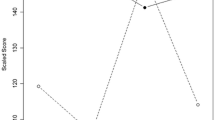Abstract
Using 3,355 class section means, the relationship between six predictor variables and student ratings of instruction (CEQ) was investigated by computing the intercorrelation matrix among all variables and by performing several regression analyses. Results of the study indicated that all linear interactions were negligible and that more than one-fourth of the criterion variance was shared with all the predictor variables. Two predictor variables, expected grade and required-elective, provided extremely large contributions to the prediction of the criterion measure, however. Implications of the validity results with respect to normative data and thus to the administrative use of the ratings were illustrated.
Similar content being viewed by others
Reference Notes
Batista, E. E., and Brandenburg, D. C. (1976). The instructor self-evaluation form: Development and validation of an ipsative forced-choice measure of self-perceived faculty performance. Unpublished.
Brandenburg, D. C., and Aleamoni, L. M. (1976). Illinois Course Evaluation Questionnaire (CEQ) Results Interpretation Manual Form 73. (Manual. Urbana, Illinois). University of Illinois at Urbana-Champaign, Measurement and Research Division of the Office of Instructional Resources.
Hildebrand, M., Wilson, R. C., and Dienst, E. R. (1971). Evaluating University Teaching. Berkeley, Calif.: Center for Research and Development in Higher Education.
References
Aleamoni, L. M. (1976). On the invalidity of student ratings for administrative personnel decision (comment). Journal of Higher Education 47:607–610.
Aleamoni, L. M., and Graham, M. H. (1974). The relationship between CEQ ratings and instructor's rank, class size and course level. Journal of Educational Measurement 11:189–202.
Aleamoni, L. M., and Spencer, R. E. (1973). The Illinois course evaluation questionnaire: A description of its development and a report of some of its results. Educational and Psychological Measurement 33:669–684.
Aleamoni, L. M., and Yimer, M. (1973). An investigation of the relationship between colleague rating, student rating, research productivity, and academic rank in rating instructional effectiveness. Journal of Educational Measurement 64:274–277.
Bausell, R. B., and Magoon, J. (1972). Expected grade in a course, grade point average, and student ratings of the course and the instructor. Educational and Psychological Measurement 32:1013–1023.
Downie, N. M. (1952). Student evaluation of faculty. Journal of Higher Education 23:495–496.
Doyle, K. O., and Whitely, S. E. (1974). Student ratings as criteria for effective teaching. American Educational Research Journal 11:259–274.
Gage, N. L. (1961). The appraisal of college teaching: An analysis of ends and means. Journal of Higher Education 32:17–22.
Garverick, C. M., and Carter, H. D. (1962). Instructor ratings and expected grades. California Journal of Educational Research 13:218–221.
Grant, C. W. (1971). Faculty allocation of effort and student course evaluations. Journal of Educational Research 64:405–411.
Granzin, K. I., and Painter, J. J. (1973). A new explanation for students' course evaluation tendencies. American Educational Research Journal 10:115–124.
Holmes, D. S. (1971). The relationship between expected grades and students' evaluation of their instructors. Educational and Psychological Measurement 31:951–957.
Jiobu, R. M., and Pollis, C. A. (1971). Student evaluations of courses and instructors. The American Sociologist 6:317–321.
Kennedy, W. R. (1975). Grades expected and grades received—their relationship to students' evaluation of faculty performance. Journal of Educational Psychology 6:109–115.
Kerlinger, F., and Pedhauser, E. J. (1973). Multiple Regression in Behavioral Research. New York: Holt, Rinehart and Winston.
Kooker, E. W. (1968). The relationship of known college grades to course ratings on student selected items. The Journal of Psychology 69:209–215.
Lovell, G. D., and Haner, C. F. (1955). Forced-choice applied to college faculty rating. Educational and Psychological Measurement 15:291–304.
Magoon, J., and Bausell, R. B. (1973). Required versus elective course ratings. College Student Journal 7:29–33.
McKeachie, W. J., and Lin, Y. (1971). Sex differences in student response to college teachers: Teacher warmth and teacher sex. American Educational Research Journal 8:221–226.
Pohlman, J. T. (1975). A multivariate analysis of selected class characteristics and student ratings of instruction. Multivariate Behavioral Research 10:81–91.
Rayder, N. F. (1968). College student ratings of instructors. Journal of Experimental Education 37:76–81.
Sheehan, D. S. (1975). On the invalidity of student ratings for administrative personnel decisions. Journal of Higher Education 46:687–700.
Weaver, C. H. (1960). Instructor rating by college students. Journal of Educational Psychology 51:21–25.
Author information
Authors and Affiliations
Rights and permissions
About this article
Cite this article
Brandenburg, D.C., Slinde, J.A. & Batista, E.E. Student ratings of instruction: Validity and normative interpretations. Res High Educ 7, 67–78 (1977). https://doi.org/10.1007/BF00991945
Issue Date:
DOI: https://doi.org/10.1007/BF00991945




